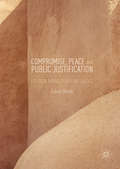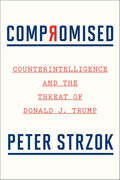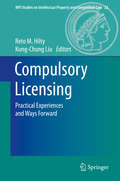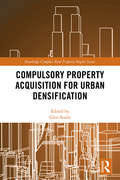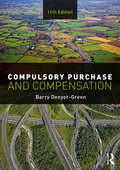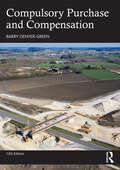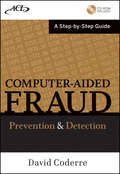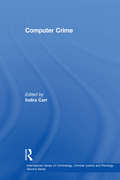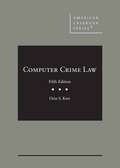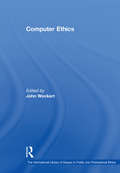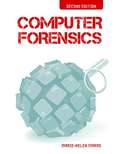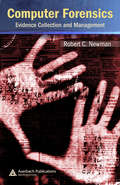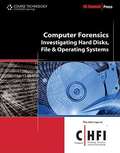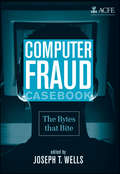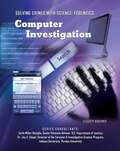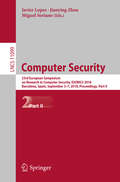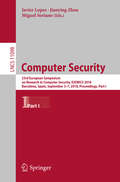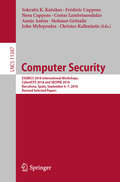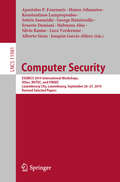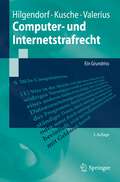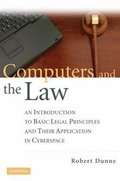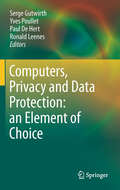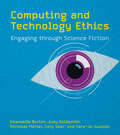- Table View
- List View
Compromise
by Alin FumurescuThis book offers for the first time a conceptual history of compromise. Alin Fumurescu combines contextual historical analysis of daily parlance and a survey of the usage of the word from the end of the sixteenth century to the beginning of the eighteenth century in both French and English with an analysis of canonical texts in the history of political thought. This book fills a significant gap in the literature about compromise and demonstrates the connection between different understandings of compromise and corresponding differences in understandings of political representation. In addition, Fumurescu addresses two controversial contemporary debates about when compromise is beneficial and when it should be avoided at all costs. A better understanding of the genealogy of compromise offers new venues for rethinking basic assumptions regarding political representation and the relationship between individuals and politics.
Compromise, Peace and Public Justification: Political Morality Beyond Justice
by Fabian WendtThis book explores the morality of compromising. The author argues that peace and public justification are values that provide moral reasons to make compromises in politics, including compromises that establish unjust laws or institutions. He explains how it is possible to have moral reasons to agree to moral compromises and he debates our moral duties and obligations in making such compromises. The book also contains discussions of the sources of the value of public justification, the relation between peace and justice, the nature of modus vivendi arrangements and the connections between compromise, liberal institutions and legitimacy. In exploring the morality of compromising, the book thus provides some outlines for a map of political morality beyond justice.
Compromised: Counterintelligence and the Threat of Donald J. Trump
by Peter StrzokThe “compelling” New York Times bestseller by the FBI counterintelligence agent who opened the investigation into Russian election meddling (The Washington Post).From “the FBI agent who started it all” (David Martin, CBS Sunday Morning), this is an epic, behind-the-scenes account of the biggest counterintelligence story of our time: Russia’s war on American democracy, and the effort to hold Putin’s collaborators to account.When he opened the FBI investigation into Russian meddling in the 2016 presidential election, Peter Strzok had spent over two decades defending the United States against foreign threats. His long career in counterintelligence ended shortly thereafter when he was forced out of the Bureau for privately voicing his political opinions about Donald Trump. But by that time, Strzok had seen more than enough to believe that the country’s new commander in chief had fallen under the sway of America’s adversary in the Kremlin. Now, with a new afterword about the aftermath of Trump’s presidency, Compromised draws on lessons from Strzok’s long career—from his role in the Russian illegals case that inspired the TV series The Americans to his service as lead FBI agent on the Mueller investigation—to construct a devastating account of foreign influence at the highest levels of our government and to reveal the lingering implications for our national security.“This is the book I have been waiting for.” —Rachel Maddow“Peter Strzok stands for an FBI that, whatever its faults, serves the nation rather than a political master. G-men have become the Henry Fondas, the Jimmy Stewarts, of the present day—the true believers in an archaic code.” —The Atlantic
Compulsory Licensing: Practical Experiences and Ways Forward (MPI Studies on Intellectual Property and Competition Law #22)
by Reto M. Hilty Kung-Chung LiuUnder the auspices of the Max Planck Institute for Intellectual Property and Competition Law (now the Max Planck Institute for Innovation and Competition). And Institutum Iurisprudentiae, Academia Sinica, a group of twenty scholars from around the world gathered to study the experiences made with regards to compulsory licensing. The results are demonstrated in this book. Different articles analyze how the international conventions on intellectual property may be interpreted and explore the related doctrinal groundwork surrounding compulsory patent licensing and beyond. It is shown how the compulsory licensing regime could be transformed into a truly workable mechanism facilitating the speedy use and dissemination of innovation and other subject matters of protection.
Compulsory Property Acquisition for Urban Densification (Routledge Complex Real Property Rights Series)
by Glen SearleDensification has been a central method of achieving smart, sustainable cities across the world. This book explores international examples of the property rights tensions involved in attempting to develop denser, more sustainable cities through compulsory acquisition of property. The case studies from Europe, North America, eastern Asia and Australia show how well, or not, property rights have been recognised in each country. Chapters explore the significance of local legal frameworks and institutions in accommodating property rights in the densification process. In particular, the case studies address the following issues and more: Whether compulsory acquisition to increase densification is justified in practice and in theory The specific public benefits given for compulsory acquisition The role the development industry plays in facilitating, encouraging or promoting compulsory acquisition What compensation or offsets are offered for acquisition, and how are they funded? Is there a local or national history of compulsory property acquisition by government for a range of purposes? Is compulsory acquisition restricted to certain types or locations of densification? Where existing housing is acquired, are there obligations to provide alternative housing arrangements? The central aim of the book is to summarize international experiences of the extent to which property rights have or have not been protected in the use of compulsory property acquisition to achieve sustainable cities via urban densification. It is essential reading for all those interested in planning law, property rights, environmental law, urban studies, sustainable urban development and land use policy.
Compulsory Purchase and Compensation
by Barry Denyer-GreenCompulsory Purchase and Compensation is the essential guide to this complex and increasingly relevant area of the law. Now in its eleventh edition, no other book presents the same level of information on the law relating to compulsory purchase and compensation in England and Wales in such an accessible way. The best-selling book on the subject, previous editions have been used by professionals and students alike in order to gain a full understanding of a key subject for any surveyor or lawyer. The book is also especially suited to those coming to this complex subject without a specific background in the law and ideal reading for those students taking planning and built environment law modules. Surveyors in particular will find this book invaluable. This new edition has been extensively revised and reflects the changes to the law in the Housing and Planning Act 2016 and the Neighbourhood Planning Act 2017, and also recent decisions of the courts and the Upper Tribunal, all of which will be of particular interest to those working on cases related to HS2, the proposed high-speed railway line from London to Birmingham, Leeds and Manchester.
Compulsory Purchase and Compensation
by Barry Denyer-GreenCompulsory Purchase and Compensation remains the essential guide to this complex and increasingly relevant area of the law. Now in its 12th edition, no other book presents the same level of information on the law relating to compulsory purchase and compensation in England and Wales in such an accessible way.The book is also especially suited to those coming to this complex subject without a specific background in the law and is ideal reading for those students taking planning and built environment modules. Surveyors in particular will find this book invaluable.Whilst this new edition picks up the very many decisions of the Upper Tribunal and the higher courts since the 11th edition, the principal piece of new legislation is the Levelling-up and Regeneration Act 2023. One of the controversial provisions in the 2023 Act is the power to include in a compulsory purchase order a direction, the effect of which is that in relation to certain limited purposes, compensation shall be assessed on the basis that no planning permission would be granted for development on the relevant land; in effect, no hope value and only existing use values would be paid.
Computer Aided Fraud Prevention and Detection
by David Coderrebecome superhuman." -Richard B. Lanza, President, Cash Recovery Partners, LLC "Computer-Aided Fraud Prevention and Detection: A Step-by-Step Guide helps management and auditors answer T. S. Eliot's timeless question, 'Where is the knowledge lost in information?' Data analysis provides a means to mine the knowledge hidden in our information. Dave Coderre has long been a leader in educating auditors and others about Computer Assisted Audit Techniques. The book combines practical approaches with unique data analysis case examples that compel the readers to try the techniques themselves." -Courtenay Thompson Jr. Consultant, Courtenay Thompson & Associates
Computer Aided Fraud Prevention and Detection
by David CoderrePraise for Computer-Aided Fraud Prevention and Detection: A Step-by-Step Guide "A wonderful desktop reference for anyone trying to move from traditional auditing to integrated auditing. The numerous case studies make it easy to understand and provide a how-to for those?seeking to implement automated tools including continuous assurance. Whether you are just starting down the path or well on your way, it is a valuable resource." -Kate M. Head, CPA, CFE, CISA Associate Director, Audit and Compliance University of South Florida "I have been fortunate enough to learn from Dave's work over the last fifteen years, and this publication is no exception. Using his twenty-plus years of experience, Dave walks through every aspect of detecting fraud with a computer from the genesis of the act to the mining of data for its traces and its ultimate detection. A complete text that first explains how one prevents and detects fraud regardless of technology and then shows how by automating such procedures, the examiners' powers become superhuman." -Richard B. Lanza, President, Cash Recovery Partners, LLC "Computer-Aided Fraud Prevention and Detection: A Step-by-Step Guide helps management and auditors answer T. S. Eliot's timeless question, 'Where is the knowledge lost in information?' Data analysis provides a means to mine the knowledge hidden in our information. Dave Coderre has long been a leader in educating auditors and others about Computer Assisted Audit Techniques. The book combines practical approaches with unique data analysis case examples that compel the readers to try the techniques themselves." -Courtenay Thompson Jr. Consultant, Courtenay Thompson & Associates
Computer Crime (International Library Of Criminology, Criminal Justice And Penology - Second Ser.)
by Indira CarrAlongside its positive impact of providing a global reach, the Internet is prone to a variety of abuses. In the 1990s it was unauthorised access of computers and impairment of the operation of computers through the introduction of viruses and worms that took centre stage. Since then the potential of the Internet for fraudulent activities has been realised by the criminal fraternity and, in recent years, we have seen, for instance, the rise of identity theft and the widespread distribution of offensive and illegal materials. The collection of essays in this volume, while being highly selective, provides a snapshot of the parameters of computer crime, the legal response and discussions surrounding ways to improve the security of cyberspace.
Computer Crime Law
by Orin S. KerrNo area of criminal law and procedure is undergoing more dramatic change, and more exciting developments, than computer crime law. The fifth edition of Kerr’s popular text has the latest cutting-edge material, including many updates since the fourth edition in 2017. New cases and materials address the Supreme Court’s recent decisions in Van Buren v. United States and Carpenter v. United States; new statutes such as the Cloud Act and state laws on nonconsensual pornography; and the latest lower court circuit splits on compelled decryption, the border search exception, private searches of computers, and e-mail scanning. The chapters on computer misuse, the Fourth Amendment, and international evidence collection have been substantially rewritten and reorganized to reflect the latest case law. The book covers every aspect of criminal law in the digital age, and it is presented in an engaging and accessible style. Topics range from computer fraud laws and international computer crimes to Internet surveillance laws and the Fourth Amendment. It is part traditional casebook, part treatise. It both straightforwardly explains the law and presents many exciting and new questions of law that courts are only now beginning to consider. The book is ideally suited either for a 3-credit course or a 2-credit seminar. It will appeal both to criminal law professors and those interested in cyberlaw or law and technology. No advanced knowledge of computers and the Internet is required or assumed. Computer crime law has become an increasingly important area of criminal practice, and this book provides the ideal introduction to the field. Many U.S. Attorney's Offices have dedicated computer crime units, as have many state Attorney General offices. Any student with a background in this emerging area of law will have a leg up on the competition. Students will also find the book easy and fun to read, while professors will appreciate the accessible introduction to an important new field with many open questions for legal scholars. The materials are authored by Orin Kerr, of UC Berkeley Law School, who is widely recognized as the leading academic authority on the law of computer crime.
Computer Ethics (The International Library of Essays in Public and Professional Ethics #No. 4.)
by John WeckertThe study of the ethical issues related to computer use developed primarily in the 1980s, although a number of important papers were published in previous decades, many of which are contained in this volume. Computer ethics, as the field became known, flourished in the following decades. The emphasis initially was more on the computing profession: on questions related to the development of systems, the behaviour of computing professionals and so on. Later the focus moved to the Internet and to users of computer and related communication technologies. This book reflects these different emphases and has articles on most of the important issues, organised into sections on the history and nature of computer ethics, cyberspace, values and technology, responsibility and professionalism, privacy and surveillance, what computers should not do and morality and machines.
Computer Forensics: Cybercriminals, Laws, and Evidence
by Marie-Helen MarasAn Updated Edition of the Definitive Computer Forensics Text. Updated to include the most current events and information on cyberterrorism, the second edition of Computer Forensics: Cybercriminals, Laws, and Evidence continues to balance technicality and legal analysis as it enters into the world of cybercrime by exploring what it is, how it is investigated, and the regulatory laws around the collection and use of electronic evidence. Students are introduced to the technology involved in computer forensic investigations and the technical and legal difficulties involved in searching, extracting, maintaining, and storing electronic evidence, while simultaneously looking at the legal implications of such investigations and the rules of legal procedure relevant to electronic evidence. Significant and current computer forensic developments are examined, as well as the implications for a variety of fields including computer science, security, criminology, law, public policy, and administration.
Computer Forensics: Evidence Collection and Management
by Robert C. NewmanComputer Forensics: Evidence Collection and Management examines cyber-crime, E-commerce, and Internet activities that could be used to exploit the Internet, computers, and electronic devices. The book focuses on the numerous vulnerabilities and threats that are inherent on the Internet and networking environments and presents techniques and suggestions for corporate security personnel, investigators, and forensic examiners to successfully identify, retrieve, and protect valuable forensic evidence for litigation and prosecution. The book is divided into two major parts for easy reference. The first part explores various crimes, laws, policies, forensic tools, and the information needed to understand the underlying concepts of computer forensic investigations. The second part presents information relating to crime scene investigations and management, disk and file structure, laboratory construction and functions, and legal testimony. Separate chapters focus on investigations involving computer systems, e-mail, and wireless devices. Presenting information patterned after technical, legal, and managerial classes held by computer forensic professionals from Cyber Crime Summits held at Kennesaw State University in 2005 and 2006, this book is an invaluable resource for thosewho want to be both efficient and effective when conducting an investigation.
Computer Forensics: Investigating Hard Disks, File and Operating Systems:
by EC-CouncilThe text provides the knowledge and skills to identify, track, and prosecute the cyber-criminal. The series is comprised of five books covering a broad base of topics in Computer Hacking Forensic Investigation, designed to expose the reader to the process of detecting attacks and collecting evidence in a forensically sound manner with the intent to report crime and prevent future attacks.
Computer Fraud Casebook: The Bytes that Bite
by Joseph T. WellsThis one-of-a-kind collection consists of actual cases written by fraud examiners out in the field. These cases were hand selected from hundreds of submissions and together form a comprehensive picture of the many types of computer fraud how they are investigated, across industries and throughout the world. Topics included are email fraud, on-line auction fraud, security breaches, counterfeiting, and others.
Computer Investigation (Solving Crimes With Science: Forensics #12)
by Elizabeth BauchnerThe digital age we entered in the twenty-first century has rapidly become an age of digital crime. Cybercrimes like spoofing, phishing, and hacking are on the rise, and computer forensic technicians are on the case. Even "traditional" crimes like murder, fraud, and child abuse can be both facilitated by computers--and solved through computer investigation. Computer Investigation helps readers understand how cybercrimes are committed, and how investigators help solve them and bring the perpetrators to justice. Readers will also gain a few tips for protecting themselves online and protecting their computers from intrusions and hacks.
Computer Security: 14th International Conference, Isc 2011, Xi'an, China, October 26-29, 2011, Proceedings (Lecture Notes In Computer Science / Security And Cryptology Ser. #3650)
by Javier Lopez Jianying Zhou Miguel SorianoThe two-volume set, LNCS 11098 and LNCS 11099 constitutes the refereed proceedings of the 23nd European Symposium on Research in Computer Security, ESORICS 2018, held in Barcelona, Spain, in September 2018.The 56 revised full papers presented were carefully reviewed and selected from 283 submissions. The papers address issues such as software security, blockchain and machine learning, hardware security, attacks, malware and vulnerabilities, protocol security, privacy, CPS and IoT security, mobile security, database and web security, cloud security, applied crypto, multi-party computation, SDN security.
Computer Security: 14th International Conference, Isc 2011, Xi'an, China, October 26-29, 2011, Proceedings (Lecture Notes In Computer Science / Security And Cryptology Ser. #3650)
by Javier Lopez Jianying Zhou Miguel SorianoThe two-volume set, LNCS 11098 and LNCS 11099 constitutes the refereed proceedings of the 23nd European Symposium on Research in Computer Security, ESORICS 2018, held in Barcelona, Spain, in September 2018.The 56 revised full papers presented were carefully reviewed and selected from 283 submissions. The papers address issues such as software security, blockchain and machine learning, hardware security, attacks, malware and vulnerabilities, protocol security, privacy, CPS and IoT security, mobile security, database and web security, cloud security, applied crypto, multi-party computation, SDN security.
Computer Security: ESORICS 2018 International Workshops, CyberICPS 2018 and SECPRE 2018, Barcelona, Spain, September 6–7, 2018, Revised Selected Papers (Lecture Notes in Computer Science #11387)
by John Mylopoulos Frédéric Cuppens Costas Lambrinoudakis Sokratis K. Katsikas Nora Cuppens Christos Kalloniatis Annie Antón Stefanos GritzalisThis book constitutes the thoroughly refereed post-conference proceedings of the 4th International Workshop on the Security of Industrial Control Systems and Cyber-Physical Systems, CyberICPS 2018, and the Second International Workshop on Security and Privacy Requirements Engineering, SECPRE 2018, held in Barcelona, Spain, in September 2018, in conjunction with the 23rd European Symposium on Research in Computer Security, ESORICS 2018. The CyberICPS Workshop received 15 submissions from which 8 full papers were selected for presentation. They cover topics related to threats, vulnerabilities and risks that cyber-physical systems and industrial control systems face; cyber attacks that may be launched against such systems; and ways of detecting and responding to such attacks. From the SECPRE Workshop 5 full papers out of 11 submissions are included. The selected papers deal with aspects of security and privacy requirements assurance and evaluation; and security requirements elicitation and modelling.
Computer Security: ESORICS 2019 International Workshops, IOSec, MSTEC, and FINSEC, Luxembourg City, Luxembourg, September 26–27, 2019, Revised Selected Papers (Lecture Notes in Computer Science #11981)
by Joaquin Garcia-Alfaro Silvio Ranise Ernesto Damiani Sotiris Ioannidis Apostolos P. Fournaris Konstantinos Lampropoulos Manos Athanatos George Hatzivasilis Habtamu Abie Luca Verderame Alberto SienaThis book constitutes the refereed post-conference proceedings of the Second International Workshop on Information & Operational Technology (IT & OT) security systems, IOSec 2019 , the First International Workshop on Model-driven Simulation and Training Environments, MSTEC 2019, and the First International Workshop on Security for Financial Critical Infrastructures and Services, FINSEC 2019, held in Luxembourg City, Luxembourg, in September 2019, in conjunction with the 24th European Symposium on Research in Computer Security, ESORICS 2019. The IOSec Workshop received 17 submissions from which 7 full papers were selected for presentation. They cover topics related to security architectures and frameworks for enterprises, SMEs, public administration or critical infrastructures, threat models for IT & OT systems and communication networks, cyber-threat detection, classification and pro ling, incident management, security training and awareness, risk assessment safety and security, hardware security, cryptographic engineering, secure software development, malicious code analysis as well as security testing platforms. From the MSTEC Workshop 7 full papers out of 15 submissions are included. The selected papers deal focus on the verification and validation (V&V) process, which provides the operational community with confidence in knowing that cyber models represent the real world, and discuss how defense training may benefit from cyber models. The FINSEC Workshop received 8 submissions from which 3 full papers and 1 short paper were accepted for publication. The papers reflect the objective to rethink cyber-security in the light of latest technology developments (e.g., FinTech, cloud computing, blockchain, BigData, AI, Internet-of-Things (IoT), mobile-first services, mobile payments).
Computer- und Internetstrafrecht: Ein Grundriss (Springer-Lehrbuch)
by Brian Valerius Eric Hilgendorf Carsten KuscheDie Informations- und Kommunikationstechnologie stellt das Strafrecht vor die Aufgabe, sowohl klassische Delikte in ihrem neuen technisierten Gewand zu erfassen als auch ganz neuen Kriminalitätsformen zu begegnen. Das Lehrbuch vermittelt einen umfassenden Überblick über das Rechtsgebiet und zeigt die aktuellen Probleme auf. Die 2. Auflage berücksichtigt Entwicklungen in Gesetzgebung und Rechtsprechung und enthält ein neues Kapitel zu strafverfahrensrechtlichen Fragen im Zusammenhang mit Computern und Computernetzwerken.
Computers and the Law: An Introduction to Basic Legal Principles and Their Application in Cyberspace
by Robert DunneComputers and the Law provides readers with an introduction to the legal issues associated with computing - particularly in the massively networked context of the Internet. Assuming no previous knowledge of the law or any special knowledge of programming or computer science, this textbook offers undergraduates of all disciplines and professionals in the computing industry an understanding of basic legal principles and an awareness of the peculiarities associated with legal issues in cyberspace. This book introduces readers to the fundamental workings of the law in physical space and suggests the opportunity to create new types of laws with nontraditional goals.
Computers, Privacy and Data Protection: An Element Of Choice
by Paul De Hert Yves Poullet Serge Gutwirth Ronald LeenesThis timely interdisciplinary work on current developments in ICT and privacy/data protection, coincides as it does with the rethinking of the Data Protection Directive, the contentious debates on data sharing with the USA (SWIFT, PNR) and the judicial and political resistance against data retention. The authors of the contributions focus on particular and pertinent issues from the perspective of their different disciplines which range from the legal through sociology, surveillance studies and technology assessment, to computer sciences. Such issues include cutting-edge developments in the field of cloud computing, ambient intelligence and PETs; data retention, PNR-agreements, property in personal data and the right to personal identity; electronic road tolling, HIV-related information, criminal records and teenager's online conduct, to name but a few.
Computing and Technology Ethics: Engaging through Science Fiction
by Emanuelle Burton Judy Goldsmith Nicholas Mattei Cory Siler Sara-Jo SwiatekA new approach to teaching computing and technology ethics using science fiction stories.Should autonomous weapons be legal? Will we be cared for by robots in our old age? Does the efficiency of online banking outweigh the risk of theft? From communication to travel to medical care, computing technologies have transformed our daily lives, for better and for worse. But how do we know when a new development comes at too high a cost? Using science fiction stories as case studies of ethical ambiguity, this engaging textbook offers a comprehensive introduction to ethical theory and its application to contemporary developments in technology and computer science. Computing and Technology Ethics: Engaging through Science Fiction first introduces the major ethical frameworks: deontology, utilitarianism, virtue ethics, communitarianism, and the modern responses of responsibility ethics, feminist ethics, and capability ethics. It then applies these frameworks to many of the modern issues arising in technology ethics including privacy, computing, and artificial intelligence. A corresponding anthology of science fiction brings these quandaries to life and challenges students to ask ethical questions of themselves and their work. Uses science fiction case studies to make ethics education engaging and fun Trains students to recognize, evaluate, and respond to ethical problems as they ariseFeatures anthology of short stories from internationally acclaimed writers including Ken Liu, Elizabeth Bear, Paolo Bacigalupi, and T. C. Boyle to animate ethical challenges in computing technology Written by interdisciplinary author team of computer scientists and ethical theoristsIncludes a robust suite of instructor resources, such as pedagogy guides, story frames, and reflection questions

